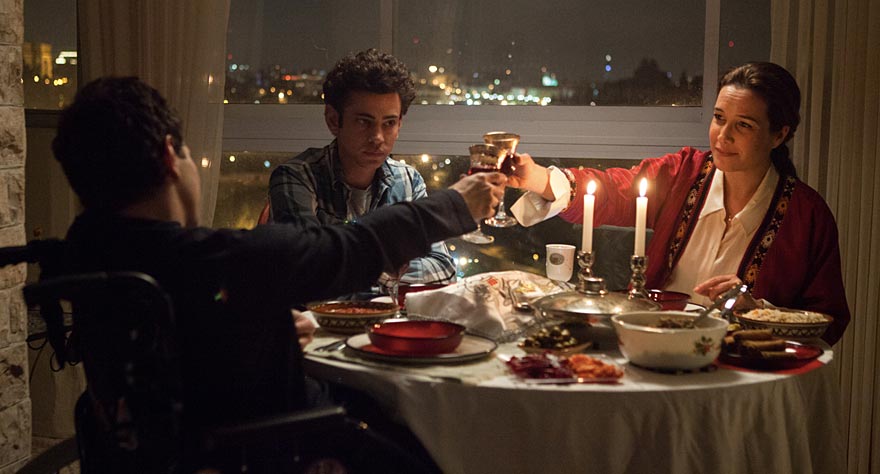
An Arab teen attending an Israeli school finds love and battles bigotry in this glorious drama.


An Arab teen attending an Israeli school finds love and battles bigotry in this glorious drama.

Mention a film set in the 1980s featuring hopelessly in love teens from opposite worlds, throw in a unique best friend for good measure, and most people might point to something from the John Hughes canon (the Hughes-penned Pretty in Pink, perhaps). “Not so fast,” lovers of foreign indies might say. From director Eran Riklis comes a film that meets the description above, and even offers a hint of that Hughesian charm. The comparisons end there, though, as what Riklis brings is far richer than anything starring the Brat Pack—a sublime film about the glory of young love, the challenge of religious identity, the pressures of family, and the despair caused by an unforgiving geopolitical climate.
Intellectually exceptional since childhood, Arab-born Eyad (Tawfeek Barhom) has been afforded the chance to attend the prestigious Jerusalem Arts and Science Academy. However, the opportunity for him is bittersweet. While he will receive the best education available in his corner of the world, he will also be the rare Arab in a school full of Israelis. The conflict of a new kid in school, something normally prevalent in teenage school settings, is exponentially worse in a geographic environment that uses map lines to define hatred.
It isn’t all bad. Expecting to be alone in his academic pursuits, Eyad finds an unlikely friend in Jonathan (Michael Moshonov), an Israeli classmate suffering from muscular dystrophy. The young men become fast friends when they find a common ground: mocking the very hatred the world says they should have for each other. Eyad eventually becomes a regular fixture in Jonathan’s home, and an invaluable help to Jonathan’s mother (Yaël Abecassis).
Soon, the beautiful Israeli student Naomi (Daniel Kitsis) catches Eyad’s eye, and eventually the two share a powerful, secret love for each other that blossoms and strengthens over the coming semesters. Still, no matter the might of that love, and no matter the faint reminder of John Hughes (sans pop soundtrack), Riklis, working from Sayed Kashua’s script, summons strong notions of William Shakespeare; these lovers are no less passionate and no less star-crossed than a couple of kids named Capulet and Montague. In the end, though, those sharp, unyielding map lines and the tensions between their cultures may be more than their relationship can bear.
Most impressive about A Borrowed Identity is how Riklis succeeds in striking a deft balance among the competing issues happening throughout the film, and how he does so completely without exploitation. This is a film that practically begs for hand-wringing moments of high melodrama, but Riklis never takes the bait. Consider the global military conflict constantly humming in the background. Riklis leaves it in the background so it is always onscreen, but never overtly so. He even finds a little humor in it. The same applies to the breathless romance (aided by wonderfully enchanting chemistry between the leads); Eyad and Naomi work through their hurdles naturally instead of pointing at them and flailing the way other dramas might. None of this is to downplay love or war, but to treat them as equally strong forces in the lives of these young people and their families.
The family dynamic is another well-measured juxtaposition, which also includes Jonathan and his mother, who become another family for Eyad. But before all that even happens, the film opens with a considerably lengthy set-up of Eyad as a child, establishing the boy’s intellect as well as adding some background information about Eyad’s family. They’re important, nice touches, but not overly critical ones. It’s highly entertaining, and indicative of Riklis’ commitment to story.
Also humming throughout the film (like the war) are Eyad’s battles with bigotry and his successes in spite of it, as well as his own evolution and maturation as a person. Riklis is so adept at managing all of this, and at knowing what the perfect tone should be from scene to scene, that as the story unfolds, not only is there no melodrama, there isn’t even a gaudy WOW moment to get the story to another place. Simpler moments are always strongest because Riklis has structured the film so soundly.